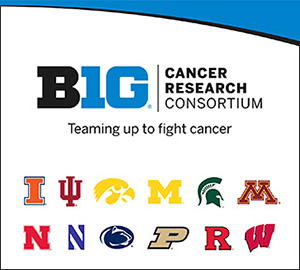Aug. 31, 2015: A conversation with Howard Bailey, MD, director of the UW Carbone Cancer Center, which is a member of the Big Ten Cancer Research Consortium (Big Ten CRC): Q: How do you think cancer research will change in the next 10-20 years? The increased collection of clinical information will lead to increased numbers of specific, potential directions to pursue unlike in the past when any new direction was embraced and pursued. The future of cancer research will involve much more “virtual research” or informatics confirmation prior to pursing a direction clinically and the need to work together to identify cancer patients with shared “personalized cancer data” for innovative targeted or... Read More
Aug. 25, 2015: Ultimate success in the fight against cancer requires advances at every stage. In this month's edition of Across the Consortium, we celebrate victories at a number of critical stages in cancer research. Through thesis formation to diverse funding acquisition, opportunities for new programs arise, leading to further innovation, collaboration, and success. Read More
Aug. 17, 2015: What type of trial is the Big Ten Cancer Research Consortium (Big Ten CRC) looking to perform? The Big Ten CRC’s mission is to perform novel, hypothesis-driven, highly translational oncology trials. Two other important components in Big Ten CRC trials is mentorship between junior and senior investigators as well as cross-collaboration between Big Ten CRC institutions. See the complete list of Big Ten CRC Research Criteria. Read More
July 16, 2015: As the Big Ten Cancer Research Consortium (Big Ten CRC) faces off against complex, diverse cancers, our member institutions continue to leverage their unique strengths to volley game-changing breakthroughs. This month’s edition of Across the Consortium highlights recent advancements on the fields of research, funding, diagnosis, and treatment. Read More
July 14, 2015: The Big Ten Cancer Research Consortium (Big Ten CRC) was established in 2013 to provide new opportunities for collaborative, investigator-initiated research at Big Ten cancer centers. Faculty at Big Ten CRC member institutions have been actively involved throughout the consortium’s development, resulting in the achievement of many milestones for the Big Ten CRC. The Big Ten CRC opened its first clinical trial recently, and numerous other trials and concepts are in the pipeline. Read More
July 1, 2015: A conversation with Douglas Yee, MD, director, and Jeffrey Miller, MD, deputy director, of the Masonic Cancer Center, University of Minnesota, which is a member of the Big Ten Cancer Research Consortium (Big Ten CRC): Q: How do you think cancer research will change in the next 10-20 years? Douglas Yee, MD (DY): In the coming years, patients will see more precise and personalized therapies due to targeted tumor profiling. Personalized medicine is the wave of the future, and we’re excited to have some incredibly strong researchers in areas like bone marrow transplant, NK cell research, and cell products. Jeff Miller, MD (JM): Here at the Masonic Cancer Center, we are addressing this shift by investing... Read More
June 22, 2015: This month, we draw attention to significant milestones and achievements at Big Ten Cancer Research Consortium (Big Ten CRC) member institutions: From the launch of the Big Ten CRC's first clinical trial at the University of Illinois, to Dr. Max Wicha's appointment to the National Cancer Advisory Board by President Obama; from significant funding to Big Ten CRC institutions by the Howard Hughes Medical Institute and the American Cancer Society, to the University of Nebraska's partnership with IBM on the Watson Genomic Analytics program. We celebrate the groundbreaking of the Michigan State University Grand Rapids Research Center, and we highlight advances in research Across the Consortium. Read More
June 5, 2015: Ruth M. O'Regan, MD, has joined the Big Ten Cancer Research Consortium Steering Committee, representing the University of Wisconsin Carbone Cancer Center. The committee, composed of one researcher from each member institution, meets on a regular basis to review activities of the consortium and decide matters of policy. The committee determines the criteria for approving concepts for development with the Big Ten CRC. Read More
June 1, 2015: A conversation with Kenneth H. Cowan, MD, PhD, director of Fred & Pamela Buffett Cancer Center (University of Nebraska), which is a member of the Big Ten Cancer Research Consortium (Big Ten CRC): Q: How do you think cancer research will change in the next 10 or 20 years? Cancer research will move toward precision cancer medicine. Using genomics and other new diagnostic tools, we will be able to employ precision medicine to customize therapies, care for each cancer patient individually, and ultimately improve outcomes. We are investing more efforts into personalized treatments including a partnership with IBM to conduct early testing... Read More

















Subscribe to the Big Ten CRC Newsletter X
X Facebook
Facebook YouTube
YouTube